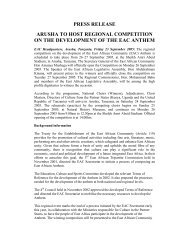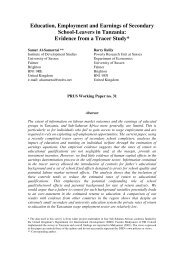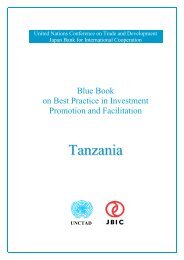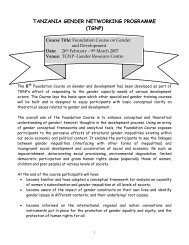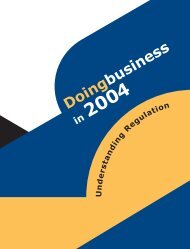September 2005 - Tanzania Development Gateway
September 2005 - Tanzania Development Gateway
September 2005 - Tanzania Development Gateway
Create successful ePaper yourself
Turn your PDF publications into a flip-book with our unique Google optimized e-Paper software.
ASPO Ireland<br />
www.peakoil.ie/newsletters<br />
that the rising global demand for oil will lead to the petroleum equivalent of running an engine at everincreasing<br />
speeds without stopping to cool it down or change the oil. Husseini does not want to see the<br />
fragile and irreplaceable reservoirs of the Middle East become damaged through wanton overproduction.<br />
''If you are ramping up production so fast and jump from high to higher to highest, and you're not having<br />
enough time to do what needs to be done, to understand what needs to be done, then you can damage<br />
reservoirs,'' he said. ''Systematic development is not just a matter of money. It's a matter of reservoir<br />
dynamics, understanding what's there, analyzing and understanding information. That's where people<br />
come in, experience comes in. These are not universally available resources.''<br />
605. Light Oil may have passed its peak<br />
The OPEC Market Report for August presents some curious statistics comparing the gravity of oil<br />
production for 2000 and 2004 between OPEC and NON-OPEC. It recognizes three classes: Light, Medium<br />
(26-35 o API) and Heavy (the cutoff for Heavy Oil at 26 o API is high compared with ASPO at 17.5 o ,<br />
Venezuela at 22 o and Canada at 25 o ). According to the numbers and percentages reported, world production<br />
of Light oil (>36 o API) has fallen from 27.1 to 23.8 Mb/d between 2000 and 2004, suggesting that it has<br />
passed its peak. But the credibility of the estimates is put into doubt when, by summing OPEC and NON-<br />
OPEC, we find World totals of 93.8 and 99 Mb/d for 2000 and 2004 respectively, compared with for<br />
example the 74.95 and 80.26 Mb/d reported in the BP Statistical Review.<br />
It just underlines how grossly unreliable oil statistics are. Apparently, some databases rely on no more<br />
than ships’ agents with binoculars counting the tankers going by and noting how low they are in the water.<br />
(Reference furnished by Hans Jud<br />
606. National Academy of Sciences Meeting<br />
The National Academy of Sciences is having a meeting on October 20-21 st in Washington to address oil<br />
supply and demand. The USGS and IEA will be represented, no doubt presenting their well-known views,<br />
while Aleklett and Simmons provide the evidence for an imminent peak in production. Hirsch will advocate<br />
planning for decline while several oil companies will cover the production on non-conventional oils.<br />
It is common for the organizers of conferences and the media to give equal weight to opposing views,<br />
allowing the audience to dismiss the issue on the grounds that no action is called for if the experts cannot<br />
agree. But the debate may open the doors for more research funding.<br />
607. The Mayor of Denver takes Peak Oil seriously<br />
On November 10-11, <strong>2005</strong>, the City of Denver will be co-hosting a high-level conference with ASPO-<br />
USA to discuss the global challenge of, and intelligent local responses to, a potential peak in world oil<br />
production.<br />
An extract from the Mayor’s invitation follows:<br />
As described in the New York Times Sunday magazine cover story on August 21, many credible<br />
geologists, scientists and analysts project that worldwide oil production will peak and subsequently<br />
decline sometime during the next 10 to 15 years. Thereafter oil would be available, but in declining<br />
amounts.<br />
As you may know, I started my career as a petroleum geologist. In my much more recent role as<br />
Mayor of Denver, I have spoken with a number of national experts based in Denver, including Tom Petrie<br />
of Petrie Parkman and Peter Dea of Western Gas Resources, about this projection and have concluded<br />
that it warrants more in-depth understanding and consideration in terms of possible impacts on the city’s<br />
economic health and future. An authoritative report funded by the U.S. Department of Energy speaks of<br />
significant economic risk tied to a possible peaking of world oil production. Given the potentially<br />
powerful financial impact on the Denver area, we will need proactive responses and we’ll need them<br />
soon.<br />
My job is to balance our budget today and to chart a future direction that preserves positive choices<br />
for tomorrow’s leaders and residents. Many of the policy decisions we make today will not only affect<br />
the City’s fuel tab, but the fuel consumption of our local businesses and residents as well All<br />
municipalities will be affected by Peak Oil.<br />
I am co-hosting the Denver World Oil Forum because I believe that deliberation and action now will<br />
not only smooth the path ahead but also create compelling new choices and opportunities for Denver. I<br />
invite you as a leader in this community to join with me. Please mark your calendar to attend.<br />
If you have any questions, please do not hesitate to contact either the director of my Sustainable<br />
ASPO Newsletter 57, <strong>September</strong> <strong>2005</strong> page 11 of 12



